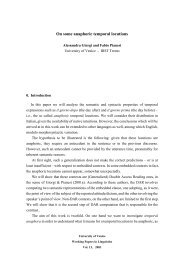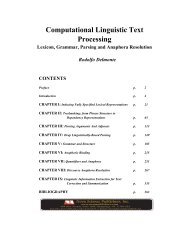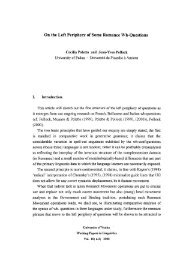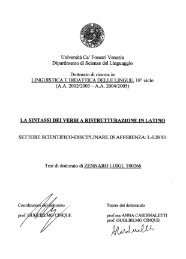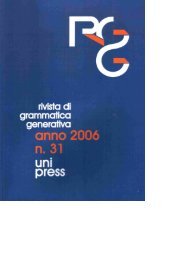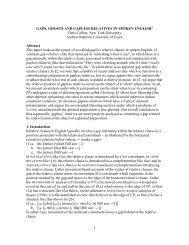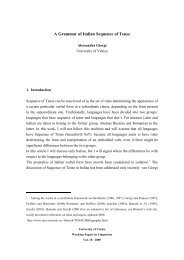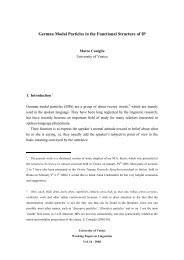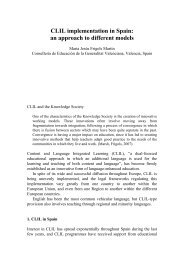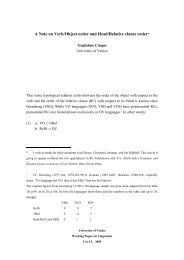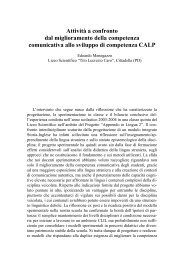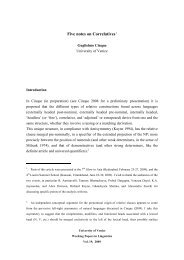Earliness Principle - Lear
Earliness Principle - Lear
Earliness Principle - Lear
You also want an ePaper? Increase the reach of your titles
YUMPU automatically turns print PDFs into web optimized ePapers that Google loves.
-28-<br />
Actually, P ollock,<br />
in a later section of his paper, proposes that “NegP” is actually<br />
“AssertionP”, where “Assertion°” can be modified by negation or by emphasis. Chomsky (1957)<br />
already noted a strong parallelism between negative sentences and sentences with emphatic do: __<br />
(102) Mary ___ did read the book.<br />
P ollock<br />
adapts Chomsky’s suggestions and posits that NegP and whatever accounts for<br />
focus as in (102) are both modifiers of Assertion°. If future investigations can invest Assertion°<br />
with some sort of semantic content, then we shall be justified in proposing an analogy between its<br />
behavior and the behavior of null for, _ _ and (8b) will be an acceptable account of the S-structure/LF<br />
asymmetry in movement over negation.<br />
T aking<br />
up once more the main thread of this section, there are still a number of possible<br />
alternatives to our hypothesis concerning µ, which I wish to mention briefly. F or<br />
example, one<br />
might accept the argument made above against µ-deletion before γ-assignment. One could then<br />
propose that µ-deletion occurs as in (89), but does not counterbleed γ-assignment in the fashion<br />
suggested by Chomsky (1989). Instead, one would suggest that µ deletes after ____ the ECP has applied<br />
(and thus plays no role in explaining movement across negation), but before _____ the version of<br />
Case-opacity in (88) applies. Notice that this hypothesis would make of µ-deletion merely a device<br />
to explain why Case-opacity effects never show up for movement to INFL. In other words, this<br />
hypothesis would account for the desired facts, but would be (for now) ad hoc.<br />
One final possibility would be to restrict Case-opacity effects to chains whose heads<br />
occupy µ. Movement through µ would escape Case-opacity effects, since the resulting chain would<br />
not be headed by µ, but movement to µ would be subject to Case-opacity. This hypothesis faces<br />
essentially the objections lodged against the ordering hypothesis of the preceding paragraph: the<br />
head/non-head distinction relates to nothing else in the system, and is therefore suspicious, though<br />
not inconceivable.<br />
I therefore conclude, somewhat cautiously, that solutions that assume µ as an<br />
obligatory constituent of IP are forced to develop ad hoc mechanisms to explain the lack of any<br />
filtering effect of µ on movement to INFL. The most attractive such alternative, modeled on<br />
Chomsky’s use of µ-deletion as an escape from ECP effects, is no different in this regard, since<br />
Chomsky’s use of µ-deletion is cast in serious doubt by the examples given in (97)-(98).<br />
3.4 Summary<br />
W esaw in our discussion of do-inertness __ that the <strong>Earliness</strong> Alternative is feasible:<br />
there is good evidence that do-insertion __ applies at its own Level of Representation. W e have just<br />
seen a somewhat more complicated argument which, if correct, militates against the Economy of<br />
Derivation. Finally, in P a rt F our,<br />
we will look at an argument that militates for <strong>Earliness</strong>.<br />
F ortunately,<br />
this argument is quite simple.<br />
4 ____________________ 4 E c o n o m y i s T ooo o W e ea _______________________________<br />
a k : D - l i n k i n g a n d W H - m o v e m e n _ t<br />
*********THIS SECTION TO BE EXP A NDED SLIGHTL Y***********<br />
In earlier work of my own (P esetsky<br />
(1987)), I argued that WH-movement is motivated<br />
in English and in languages like P olish<br />
by two separate conditions.<br />
The first is a condition on the Q-morpheme in COMP (or INFL) which requires that<br />
one WH-phrase move to its SPEC by S-structure: thus every WH-question (particularly an



